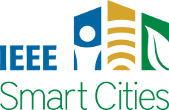Foreword: Communication Devices and Systems for Smart City Infrastructures
Written by Vyasa Sai, Haesik Kim, and Bernard Fong
One of the important features of a smart city is enhanced healthcare, safety and efficiency. Driven by the recent trends of smart cities development across the world, political decision makers and service providers, as well as local residents and visitors are expecting to enjoy more efficient and reliable solutions to the growing problems associated with services across smart cities. Rapid advances of telecommunication technologies provide solutions to these problems, which has initiated ICT professionals to design and implement various smart city initiatives [1].
In many cases, the development of integrated solutions in smart cities often entails a blend of various AI solutions and connected devices, applications like assistive elderly care [2], transportation [3], and smart energy [4] are common examples that heavily rely on communication devices and systems. All these devices and systems form an essential part of an overall smart city infrastructure. This is often realized by means of smart services that utilize fixed and mobile networked sensors, as well as actuators deployed in the smart city, thereby allowing relevant agencies to monitor the smart city environment in real-time. This enables them to respond appropriately when needed and establish automated management processes with minimal manual intervention [5]. Such services can only be reliably carried out through the use of efficient and reliable communication devices and systems that operate across the smart city, as well as in the cloud environment.
This October special edition addresses various issues concerning the design and implementation of communication devices and systems technologies, by featuring three articles that cover different parts of communication technologies in a smart city - infrastructure context that cover integration and interaction, architectures, service-oriented applications, security, and privacy.
The first paper, entitled “Data Analytics Strategies for Assessing Pollution Spread Using Sensor Data” provides a novel approach on air quality monitoring through analyzing data from a sensing network. This is followed by taking a look at 5G deployment in the capital city of Kenya on “Scaling Narrowband-IoT to Drive 5G Adoption for a Smart City - A Case Study of Nairobi City”. Finally, the article “SoftCity: Softwarized and Adaptive Network Slicing for Intelligent Smart City Communication” presents a software-based AI solution on network management.
References
- Lv, Z., Chen, D., & Li, J. (2021). Novel system design and implementation for the smart city vertical market. IEEE Communications Magazine, 59(4), 126-131.
- Yeung, A., & Wu, C. (2021) AI for Elderly Dietary Care: A Cyber-Physical System for Nutrition Management, IEEE Smart Cities Newsletter, Aug., 3(8).
- Lv, Z., Qiao, L., Cai, K., & Wang, Q. (2020). Big data analysis technology for electric vehicle networks in smart cities. IEEE Transactions on Intelligent Transportation Systems, 22(3), 1807-1816.
- Lai, Q. H., & Lai, C. S. (2022). Healthcare With Wireless Communication and Smart Meters. IEEE Consumer Electronics Magazine.
- Deng, T., Zhang, K., & Shen, Z. J. M. (2021). A systematic review of a digital twin city: A new pattern of urban governance toward smart cities. Journal of Management Science and Engineering, 6(2), 125-134.
To view all articles in this issue, please go to October 2022 eNewsletter. For a downloadable copy, please visit the IEEE Smart Cities Resource Center.



To have the eNewsletter delivered monthly to your inbox, join the IEEE Smart Cities Community.
Past Issues
To view archived articles, and issues, which deliver rich insight into the forces shaping the future of the smart cities. Older eNewsletter can be found here. To download full issues, visit the publications section of the IEEE Smart Cities Resource Center.



